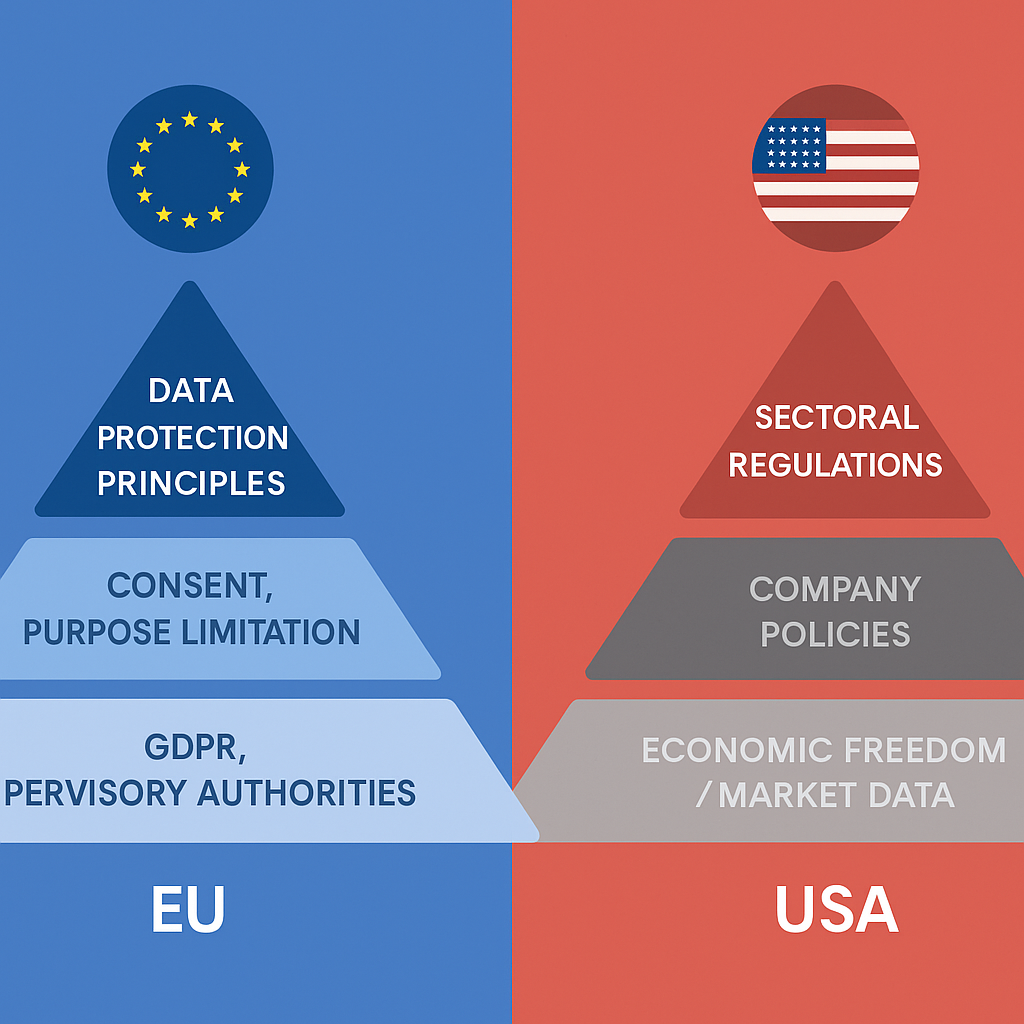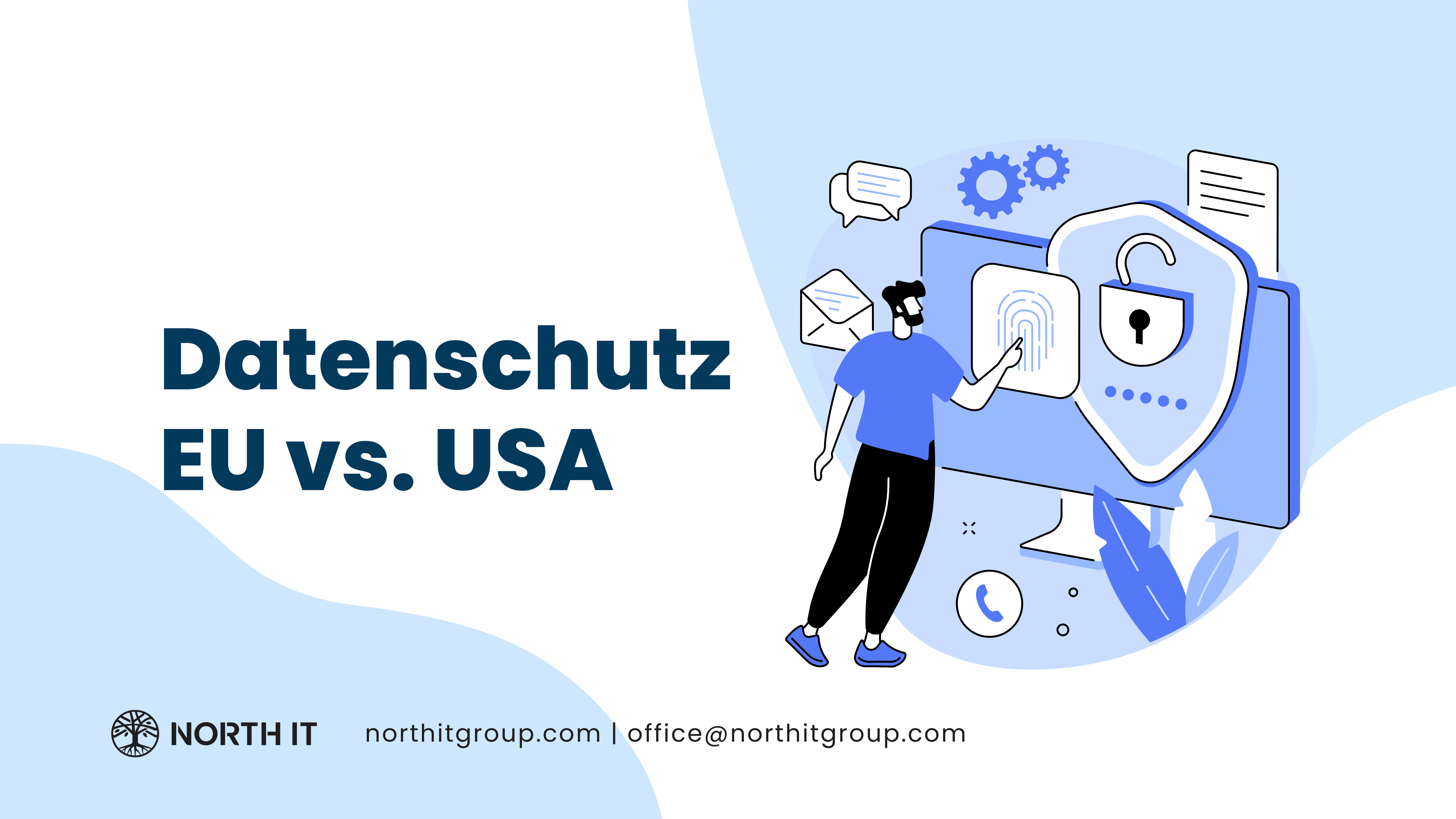Data protection EU vs. USA - a comparison
In a globalized business world in which IT services are also offered to users from the EU for a fee, the protection of personal data in accordance with the GDPR is of crucial importance. A comparison between the European Union (EU) and the United States of America (USA) in particular reveals significant differences in data protection laws. It is therefore essential for company managers to understand these divergences in order to act in a legally compliant manner and ensure data security. We shed light on the differences and similarities and provide important tips for working with services from the USA. Data protection in the EU and the USA differs fundamentally in terms of approach and implementation. While the EU has created a uniform and strict legal framework with the General Data Protection Regulation (GDPR), the US system is more fragmented and offers a different level of data protection. Special features in countries such as Germany, Austria and Switzerland reinforc the need to deal with local data protection laws. Company managers in the European Union must pay attention to certain aspects when working with US services in order to ensure compliance and minimize risks.
| Topic | EU (GDPR) | USA (Cloud Act, HIPAA etc.) |
| Legal framework | Uniform and comprehensive | Sector-specific, decentralized |
| Rights of data subjects | Strong (erasure, information, etc.) | Weaker, depending on the law |
| Access by authorities | Restricted, only with legal basis | Far-reaching, also abroad |
| Data transmission | Only permitted with protective mechanisms | No explicit restriction |
| Enforcement | Strict fines, data protection authorities | Varies, depending on the federal state |
Data protection in the EU: GDPR as a benchmark
The GDPR has set the standard for data protection in the EU since 2018. It is considered one of the strictest data protection laws in the world and aims to protect the personal data of all EU citizens and regulate data processing companies. The GDPR is characterized by its comprehensive rights for data subjects, such as the right to information, correction and deletion of their data. It also lays down strict requirements for consent to data processing and for data transfer to third countries.
Data protection in the USA: a fragmented picture
In contrast to the EU, the USA does not have a uniform legal framework for data protection. Instead, there are sector-specific laws and state regulations that take a less restrictive approach. Well-known examples include the Health Insurance Portability and Accountability Act (HIPAA) for health data and the Children's Online Privacy Protection Act (COPPA), which regulates the privacy of children on the internet.
Similarities and differences
Although the approaches are different, there are also similarities. For example, both the EU and the USA recognize the need for data protection measures. Differences exist above all in the scope of the rights of data subjects and in the obligations of data processing companies. While the EU takes a data protection-friendly stance, the focus in the USA is more on self-regulation and the free movement of data.

Special features in Germany, Austria and Switzerland
Within the EU and the European Economic Area (EEA), the GDPR harmonizes data protection. Nevertheless, countries such as Germany, Austria and Switzerland have their own data protection laws, which have been adapted to the GDPR and have local specifics. In Germany, the Federal Data Protection Act (BDSG) supplements the EU General Data Protection Regulation (GDPR) and contains special provisions, particularly in the area of employee data protection and the need for a company data protection officer. The regulations are particularly strict with regard to data protection in telecommunications and on the internet. In Austria, the GDPR is supplemented by the national Data Protection Act (DSG). Here, there are stricter requirements for video surveillance and specific special regulations for education and employee data. The data protection authority acts as the central supervisory authority. Switzerland, as a non-EU member state, is based on the GDPR with its own Data Protection Act (DSG), but also has its own priorities. The new DPA, which comes into force in 2023, places a particular focus on transparency and data security. Switzerland also has its own regulations for cross-border data traffic.
Working with US service providers: What needs to be considered?
Data retrieval by US security services under the USA Patriot Act and Cloud Act is critical. These laws allow US authorities to gain access to data stored by companies based in the USA under certain conditions, regardless of whether the data is physically located in the USA or abroad. Identifying whether data has been accessed by US authorities under the USA Patriot Act and Cloud Act can be challenging, as these laws often come with a confidentiality obligation for the companies concerned. For company managers who work with US services, compliance with the GDPR is mandatory. They must ensure that the data transfer to the USA offers adequate data protection standards, which can be achieved through appropriate protective measures such as standard contractual clauses or Binding Corporate Rules (BCR). In addition, a watchful eye must be kept on compliance with the Privacy Shield regulations, despite their repeal by the ECJ, and on possible new agreements between the EU and the USA.
Data protection is not easy and requires not only legal aspects but also technical expertise. North IT Group GmbH is at your side as an experienced partner to help you digitize your business processes efficiently and in compliance with data protection regulations.
Image source: canva.com



